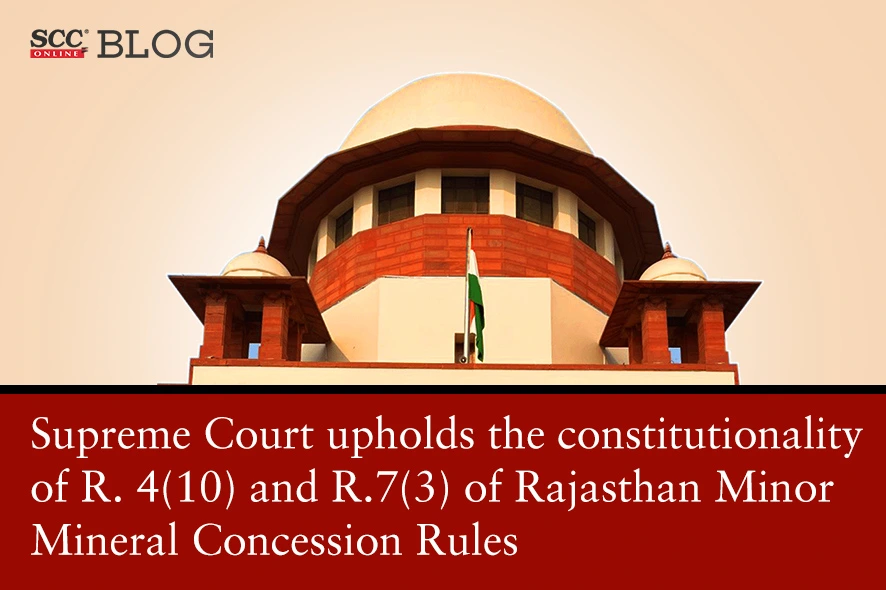Supreme Court: In batch of appeals filed to overturn the decision of the Division Bench of the Rajasthan High Court declaring Rule 4(10) and Rule 7(3) of the Rajasthan Minor Mineral Concession Rules, 1986 (‘the Rules’) as unconstitutional, the division bench of A.S. Bopanna and MM Sundresh*, JJ. said that the impugned Rules have been introduced in exercise of the power conferred under Section 15 of the Mines and Minerals (Development and Regulation) Act, 1957 (‘1957 Act’). There is neither a right nor does it get vested through an application made over a Government land. Further, it viewed that the High Court has totally misconstrued the issues ignoring the fact that there is a delegation of power to the State which was rightly exercised as conferred under Section 15 of the 1957 Act. Thus, the Court set aside the impugned judgments.
The Court took note of the said Rules and said that these Rules were brought into statute by the State in exercise of the powers conferred by Section 15 1957 Act for regulating the grant of quarry licenses, mining leases and other mineral concessions qua minor minerals. Chapter II of the Rules deals with the grant of leases. Rule 7 speaks of preferential rights of certain persons. Prior to the amendment made on 28-01-2011 as per the said Rule, an applicant shall have a preferential right over the others on the sole basis of his application being made prior in point of time. This preferential right was not made available when an application is received from a Government Company or Corporation. The Court noted that this Rule does not stand in the way of the State in making appropriate amendments to the Rules in general.
The Court noted that after the amendment to these Rules by way of a Notification dated 28-01-2011, sub-rule (10) had been introduced to Rule 4 placing a condition that there cannot be a mining lease in a Government land excluding marble and granite, unless the area is delineated and thereafter applications are to be invited. However, the proviso stated that the applications pending on the date of the Notification shall be disposed of as per the prevailing Rules prior to it. A further amendment was made to Rule 7 by way of substitution of sub-rule (3)
The State thought it fit to introduce the process of auction, while making it clear that the applications received prior to 27-01-2011 shall be disposed of as per the prevailing rules, in force earlier. Thereafter, the Rules went through further amendment by way of Notification dated 03-04-2013 by which all the pending applications are to be rejected. The Court concluded that the impugned Rules undertake two exercises; the process of auction as existed earlier, and creation of a level playing field by declaring all the pending applications, meant to be considered on a first-come first-serve basis, as rejected.
The Bench reiterated that there is no right vested over an application made which is pending seeking lease of a Government land or over the minerals beneath the soil in any type of land over which the Government has a vested right and regulatory control. Thus, a mere filing of an application ipso facto does not create any right. Further, after placing reliance on Monnet Ispat & Energy Ltd. v. Union of India, (2012) 11 SCC 1, it reiterated that the applicants do not have fundamental right in mining.
Further, the Court also took note of State of T.N. v. Hind Stone, (1981) 2 SCC 205, and said that when the Government decides to introduce fair play by way of auction, facilitating all eligible persons to contest on equal terms, certainly one cannot contend that he is entitled for a lease merely based on a pending application. The right being not legal, apart from being non-existent, it can certainly not be enforceable.
[State of Rajasthan v. Sharwan Kumar Kumawat, 2023 SCC OnLine SC 898, decided on 01-08-2023]
*Judgment Authored by: Justice MM Sundresh
Know Thy Judge | Supreme Court of India: Justice M.M. Sundresh






